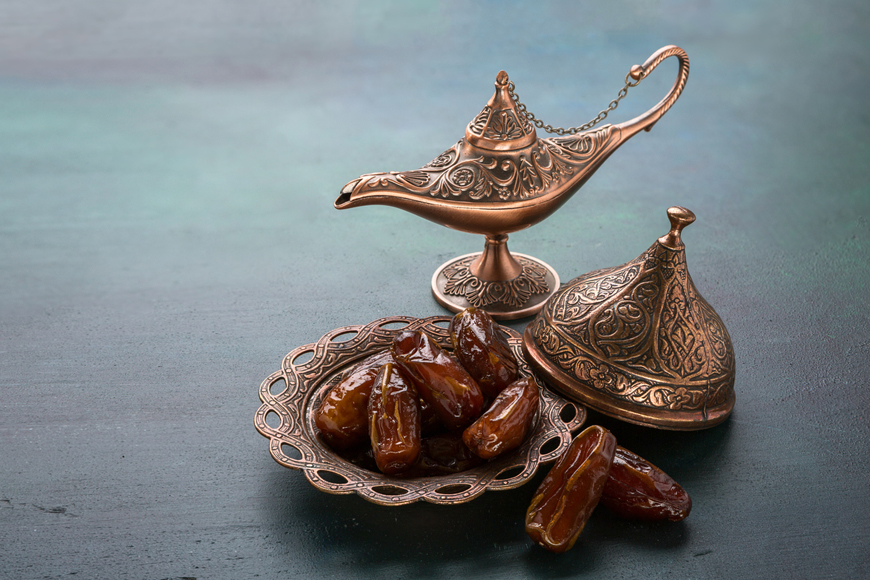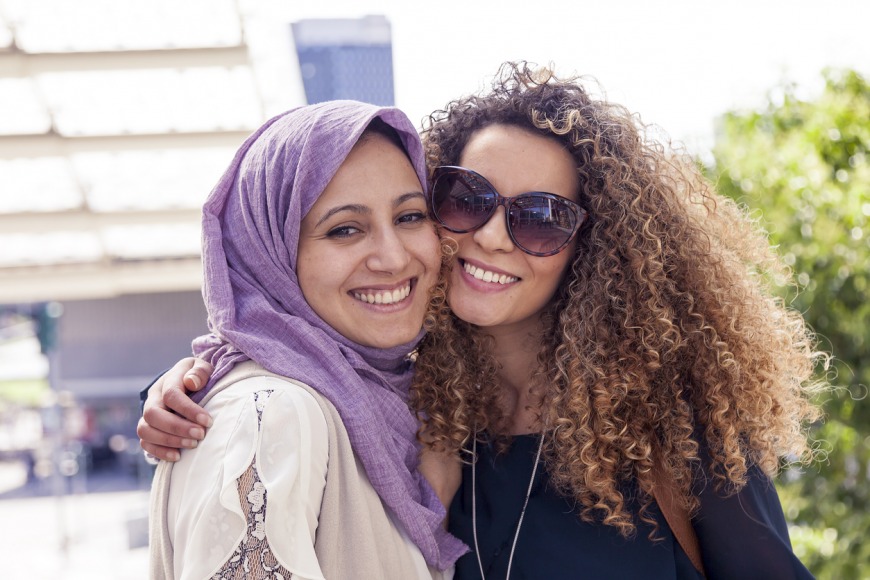Will this be your first Ramadan in Dubai? Here’s a complete guide to Ramadan 2023 for expats

The Holy Month of Ramadan in the UAE will begin on Thursday March 23, 2023.
Yearly, the actual date varies depending on the moon sighting closer to the time and would later be confirmed by officials.
During this month, Muslims across the world participate in a month-long fast. Observers fast from sunrise to sunset, and it’s the holiest month on the Islamic calendar.
If this will be your first Ramadan, or you’re in need of a refresh – here’s our ultimate guide to Ramadan 2023 for you!
When is the Holy Month of Ramadan?
Ramadan is the ninth month of the Islamic lunar calendar and is one of the most important months for Muslims as it is believed this is the month that the Qu'ran was first revealed to the Prophet Mohammed (PBUH).
When does Ramadan start and end?
Ramadan dates change every year, as the Islamic calendar is based on the lunar cycle. Meaning, dates of religious holidays in the UAE and elsewhere may change on the Gregorian calendar every year.
Ramadan 2023 is confirmed to start on Thursday March 23rd. Typically, the official start date of Ramadan will depend on the moon sightings, and the official starting date will usually be announced shortly before the Holy Month begins.
Ramadan is anticipated to end on Friday, April 21st . Again, every year we typically wait on the final word from officials.
SEE ALSO: 6 frequently asked questions about Ramadan
Following the Holy Month, Eid al-Fitr is observed directly after the last day of Ramadan. Then around a month later, Eid al-Adha occurs.
Keep these Ramadan dates in your calendars…
- When is Ramadan? Thursday 23rd of March, to Friday 21st of April, 2023
- When is Eid al-Fitr? Expected to run from April 20th - 23rd, 2023.
- When is Eid al-Adha? Expected to run from June 28th - 30th, 2023.

What is Ramadan?
The Holy Month of Ramadan is a special month in the Islamic calendar, as it is when Muslims worldwide fast from sunrise to sunset, for 29 or 30 days. The act of fasting is known as ‘sawm’, and is one of the five pillars of Islam that Muslims follow.
The word ‘Ramadan’ itself comes from the Arabic root ramida or ar-ramad, which means scorching heat or dryness.
Why do Muslims fast during Ramadan?
During the Holy Month, Muslims refrain from consuming food, drinking liquids, smoking and engaging in intimate relations. Muslims are also instructed to refrain from sinful behaviour that may negate the act of fasting, like fighting (unless self-defence) or false speech.
Spiritual rewards, known as ‘thawab’, for fasting are believed to be multiplied within the month of Ramadan. Muslims are also encouraged to increase their acts of good deeds and charity, as well as offering increased ‘salat’, meaning prayers.
The most common observances for Muslims during Ramadan:
- Fasting
- Charity, known as ‘zakat’ and ‘sadaqah’
- Nightly prayers
- Recitation of the Quran
Fasting or 'sawm' is obligatory for adult Muslims, except for individuals who have an illness, are travelling, and are elderly, pregnant, breastfeeding, diabetic, chronically ill or menstruating. 'Sawm' is one of the five pillars of Islam which all Muslims are expected to follow.
It becomes compulsory for Muslims to begin fasting when they reach puberty, so long as they are healthy. Children can be encouraged to try fasting for shorter periods of time before reaching puberty age to help practice for later life.
When can someone break their fast in Ramadan?
Individuals with a medical condition are discouraged from fasting from the beginning, as well as pregnant women. These must abide by the rules of eating and drinking discreetly, away from public eyes.
However, individuals who knowingly break their fast during Ramadan must repent, and make up for that day of fast later on.

How can non-Muslims get involved with Ramadan?
Non-Muslim expatriates living in the UAE most definitely can get involved in the spirit of the Holy Month, and are encouraged to do so. In the Gulf, hundreds of Iftar and Suhoor events are arranged, as well as Ramadan tents, as a way to help bring communities together. Even if you aren’t fasting, non-Muslims are welcome to join in.
Here are some other fun ways to get involved with Ramadan as a non-Muslim:
- Exchange Ramadan greetings, especially towards the start of the month. ‘Ramadan Kareem’ is the most commonly used greeting, with the word ‘Kareem’ meaning ‘generous’. So basically, you’re wishing your friends, colleagues and strangers a generous Ramadan.
- Join in charitable efforts by assisting with care packages, Ramadan Fridges, help at Ramadan camps and any other not-for-profit organisation who is arranging something for Ramadan.
- Try fasting with your Muslim colleagues or friends for a day or two, then break your fast together at Iftar.
- Give water and dates, or snacks, to workers nearby to your home as Iftar arrives.
Charitable efforts is a very important part of Islam, and is even more significant during Ramadan. You don’t have to be a Muslim to partake in these efforts, and there are lots of initiatives in Dubai that you can join in with.
What is Iftar and Suhoor?
For fasting Muslims, Iftar is the meal to break their fast at sunset. In Dubai and the UAE, there are normally hundreds of wondrous Iftar buffets and events you can join in with as a non-Muslim.
You would have the chance to witness your Muslim friends and colleagues breaking their fast, typically with a date and some liquids, after which you’ll enjoy an array of international and Arabic dishes as well as popular Ramadan juices.
SEE ALSO: Do's and don'ts of the Holy Month of Ramadan in Dubai
Suhoor is the meal taken before sunrise, before the day of fasting begins. This can occur very early in the morning, and some venues do host Suhoor buffets and small activities in the earlier hours for individuals fasting to enjoy.

Can you eat or drink in public during Ramadan?
The quick answer to this is: no. Everybody should refrain from eating, drinking and smoking in public during daylight hours throughout Ramadan in Dubai.
Anyone caught doing so may cause extreme offence to others around then, and you may even face a fine from Dubai Police.
When and where can I eat during daylight hours?
Show respect for those who are fasting during the day by not eating and drinking in front of them; whether it's in work or in public.
Non-Muslims will find that most restaurants, cafes and bars will be open during Ramadan offering their normal menus, but discreetly. You’ll find that curtains or blocked out windows will be up during the Holy Month to ensure any consumption of food and drink in an outlet is discreet and hidden from the public.
But as of April 2021, Dubai Economy officials confirmed that restaurants and cafes in the emirate can serve with screens, curtains, or dividers.
How should I handle food gifts from neighbours or colleagues?
The traditional Arabic date is a fine gift to give or receive during the Holy Month, as the date symbolises Arabic traditions in breaking the fast at Iftar. If you receive such a gift, be respecful in receiving it, but it's fine to not open or touch it until you return home or after-dark.
Useful Ramadan greetings and phrases to learn and say
As expats living in a Muslim country, we always advise to learn some basic phrases to use in conversation with Muslims living here. Friendly words in any language are welcome to say throughout the Holy Month, such as "I hope you have a blessed Ramadan", or "may you have a peaceful Ramadan."
Besides the general hello, goodbye and how are you, here’s some handy Ramadan phrases to learn that you can use during the Holy Month:
- Ramadan Kareem: Happy/generous Ramadan
- Ramadan Mubarak: Blessed Ramadan
- Iftar shahy: Have a good Iftar
- Siyam Kareem: Blessed fasting
- Taqabbala Allah: May God accept your fasting/prayers
- Embarak alaikum shahr Ramadan: May the month of Ramadan be a blessing for you
- Enta sayem?/Enti sayma?: Are you fasting? (Male/Female)
- Anaa saa’im: I am fasting
- Mubarak aleik al shahr: May you get the blessings of the month
- Kil aam wa inta fee kheir: May each year pass and you be well
- Eid Mubarak: Blessed Eid
Other important things about Ramadan to know
Besides the no eating and drinking rule, there are some other important things non-Muslims living in Dubai should be aware of during the dates of Ramadan. We have more information about the do's and don'ts during Ramadan in our guide here.
- Ensure you are dressed conservatively throughout Ramadan, as not doing so may cause offence to those fasting. As a rule of thumb, ensure your shoulders and knees are covered at all times in public.
- Refrain from listening to music too loudly, however it is acceptable to wear headphones and listen to music from your phone, tablet or computer.
- Be extra considerate on the roads, especially around sunset, as people will be driving to Iftars or mosques to break their fast.
- Some businesses change their opening hours - usually they have shorter days to allow for those that fast to take rest
- Most if not all malls extend their opening hours to the early morning hours, or even all night! This allows those who have fasted to catch up with their daily routines.




.png?itok=HBSyMDok)









































































.png)



























.png?itok=0fOAXkOm)

























.png?itok=EH_x0Pha)
